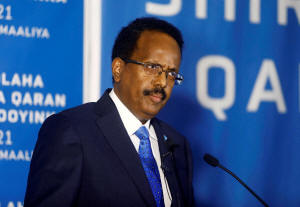Somali police announce curfew in capital during Sunday's presidential
vote
 Send a link to a friend
Send a link to a friend
 [May 14, 2022] By
Feisal Omar [May 14, 2022] By
Feisal Omar
MOGADISHU (Reuters) - Police in Somalia
have announced a 33-hour curfew on the capital Mogadishu that will keep
almost all residents at home during a presidential election by lawmakers
on Sunday, in which incumbent leader Mohamed Abdullahi Mohamed is
seeking a second term.
Police spokesperson Abdifatah Aden announced at a press conference on
Saturday a full curfew in the city, covering both traffic and people,
from Saturday at 9:00 PM (1800 GMT) until Monday at 6:00 AM.
Lawmakers, security personnel and all others officials involved in the
vote are still free to move during those hours.

The indirect election, in which lawmakers will pick a president, will
take place in an airport hangar behind blast walls to help fend off
potential Islamist attacks or meddling by factions within the security
services.
Mohamed is facing 37 opponents in the vote, including two former
presidents, Sharif Sheikh Ahmed and Hassan Sheikh Mohamud, who analysts
see as the frontrunners.
Originally they were 39, but between Thursday and Friday two candidates
announced they were exiting the race.
[to top of second column]
|

Somalia's President Mohamed Abdullahi Mohamed addresses delegates at
the Somali election negotiation in Mogadishu, Somalia May 27, 2021
REUTERS/Feisal Omar/File Photo

Polls are due to commence early Sunday and are
expected to proceed late into the night amid a volatile security
atmosphere in which police fear Islamist group al Shabaab could seek
to carry out attacks to disrupt the event.
The al Shabaab insurgency has gripped Somalia for
more than a decade, and a promise by Mohamed at his inauguration in
2017 to "finish" the group has gone unfulfilled.
Al Shabaab says it wants to topple the Horn of Africa country's
central government and establish its own rule based on its strict
interpretation of Islam's sharia law.
Somalia's next leader will inherit a daunting list of challenges,
including the worst drought in 40 years, a violent conflict entering
its fourth decade, clan feuds, and a power struggle between the
government and federal member states.
(Writing by Elias Biryabarema; Editing by Jan Harvey)
[© 2022 Thomson Reuters. All rights
reserved.]
This material may not be published,
broadcast, rewritten or redistributed.
Thompson Reuters is solely responsible for this content. |